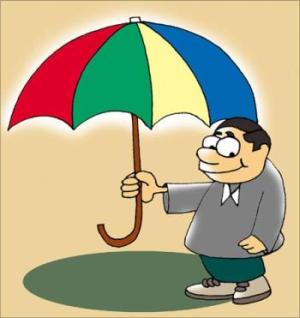Photographs: Rediff Archives
A brief evaluation of what insurance riders are actually about and which one of them could be most appropriate for you.
Riders along with insurance policies are additional benefits that could be opted for over and above your base policy. Available at an extra premium, they enhance and customise your insurance policy to meet your specific needs. Insurance companies offer a host of insurance riders to choose from.
From critical illness to disability, these riders are surely a great way to give yourself and your family the much needed extra protection from unforeseen calamities.
A dummy's guide to understanding insurance riders
Photographs: Rediff Archives
Why opt for riders?
The single big reason to opt for a rider is that it gives you an additional level of financial protection. Apart from this, riders also offer you the following:
Tax advantage: Riders give you a tax benefit under Section 80C on the premiums paid, up to a sum of Rs 1 lakh. Health and critical illness riders offer a tax benefit up to a maximum of Rs 10,000 under Section 80D
Protection without having to take a second policy: Riders save you the trouble of having to take a second policy, in case of a specific requirement
Choice of two or more riders: You could opt for two more riders, to customise your policy to meet present as well as future financial requirements
Could be attached to any type of policy: Riders could be attached to almost all types of policies. So you can customise any type of policy -- term, endowment, money back, whole life and ULIP.
A dummy's guide to understanding insurance riders
Photographs: Rediff Archives
Riders are affordable
The premium on riders is much lower than the premiums on the base policy, owing to the fact that the rider premiums go entirely towards the risk covered and not towards any savings component. There really isn't any limit on the number of riders you could opt for. Multiple riders though could substantially increase the cost of your insurance policy.
Moreover, as per IRDA regulations the premiums of all riders put together, in a single policy should not exceed 30 per cent of the premium of the base policy.
A dummy's guide to understanding insurance riders
Photographs: Rediff Archives
Making the choice
Insurance companies give you the option either to opt for a rider at policy inception or any time during the course of the policy. It is nevertheless recommended to opt for it at the beginning of the policy itself, as the costs tend to get higher when the policy rolls on, depending on your health and age.
Here are five typical insurance riders offered by insurance companies:
1. Accidental Death Benefit Rider
- Provides additional cover in the event of accidental death of the insured, generally around 100 per cent of the base policy's cover amount
- Accidental death in this case means death caused by violent, accidental, external and visible means and independent of any physical or mental illness
- Recommended at all stages of life
2. Waiver of Premium Rider
Waives all future premiums of the base policy as well as the rider, in case of total and permanent disability due to an accident
A dummy's guide to understanding insurance riders
Photographs: Rediff Archives
3. Permanent Disability Benefit
- Provides an additional cover in case of permanent disability due to an accident
- Permanent disability here means permanent and immediate inability to work or permanent loss of use of two limbs or total and permanent loss of sight
4. Critical Illness Rider
- Provides an additional cover in the event of major medical illness such as Heart Attack, Cancer, Stroke, Kidney failure, organ transplants, Aorta and Heart Valve surgery
- Recommended along with pension plans
5. Income Benefit Rider
In case of death of the life assured, around 10 per cent of the rider sum assured is paid every year to the beneficiary on the policy anniversary, ensuring financial independence to dependents.
A dummy's guide to understanding insurance riders
Photographs: Rediff Archives
Riders and insurance needs
The decision to buy an insurance rider should be solely based on your individual insurance needs, and not because you have been persuaded by your insurance agent to buy one. Before you decide to buy a rider, you need to do a comprehensive evaluation of the nature of your job, and your family commitments.
Say, for example, your job involves you to be on a construction site on a daily basis, disability insurance may make more sense for you. For those, whose job involves frequent road travelling, an accident insurance could well be suitable. To narrow down on the most appropriate insurance rider, it is vital to do a critical evaluation of your financial needs.
Also, do not forget to go through the terms and conditions and exclusions of the rider. Rider terms and conditions are generally independent of what would be mentioned on your base policy.








Comment
article